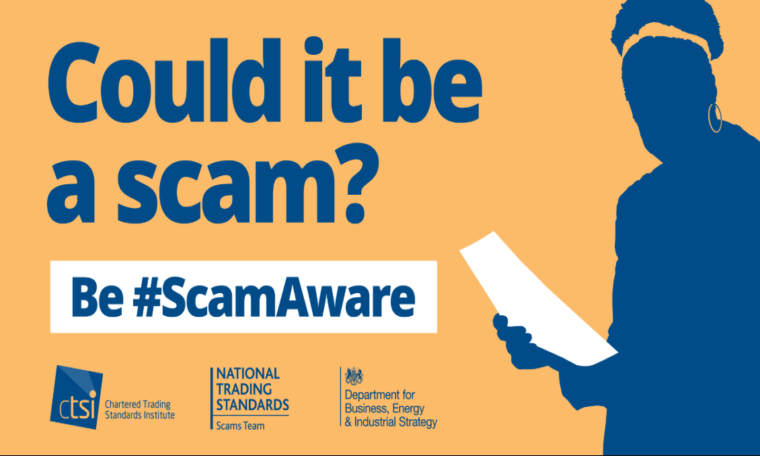
We’re supporting Scams Awareness Campaign 2020. As a member of the Consumer Protection Partnership (CPP) which includes Citizens Advice, National Trading Standards and the Competition and Markets Authority, we’re working with our partners to raise consumer awareness and help equip them with the skills they need to recognise, avoid falling for and to report scams.
Scams cost UK consumers billions every year. They come in all shapes and forms, from doorstep confidence tricksters to sophisticated large scale online operations with a global reach. Anyone can fall for a scam. It is not just vulnerable people who can find themselves duped. Scams can be complex and catch out even the most well informed or cautious consumer.
A particular focus of this year’s campaign is on COVID-19 related scams. At a time when lots of people are under financial pressure, health related anxieties are widespread and businesses face existential threats; the danger of scams that tap into and prey on people’s vulnerabilities during the health crisis is acute. Lockdown hasn’t deterred scammers.
Research by Citizens Advice reveals that over a third of British adults (36%) have been the target of a scam since lockdown began.
Polling conducted on behalf of the charity also showed that certain groups were at an increased risk of being contacted by a scammer, often those who could least afford it:
- Of those with a disability or long term illness, 45% said they had been targeted
- Half (50%) of those at an increased risk of coronavirus or shielding had been contacted
- Over half (54%) of those who have lost personal income due to the virus have also been contacted.
It is perhaps unsurprising that during this public health crisis there has been a rise in reports of scams involving personal protective equipment such as face masks or for bogus testing kits, vaccinations and government refunds.
We want to reassure consumers that the majority of ads you see and hear every day can be trusted. But we will not hesitate to step in and take action to ban ads that don’t stick to the rules, treat consumers unfairly and are misleading.
During lockdown we’ve reprioritised our work, focussing on ads that seek to use the pandemic in a way that exploits the public’s health fears, the difficult financial or employment circumstances that many people are now facing or that grossly undermine public health advice. We have fast tracked cases of this nature and followed-up with enforcement action.
As part of the Scams Awareness Campaign we’re here to provide advice to consumers and, where a business or individual is using advertising to operate a scam and behaving fraudulently, act where we can to stop it. Often that means coordinating with law enforcement bodies who are better placed to intervene.
What measures can we all take to protect ourselves and others from falling victim to a scam?
Citizens Advice has put together some useful tips for consumers.
If you’re worried you or someone you know is being scammed:
- Look into installing a call blocker to help combat telephone scams
- Talk to your or their bank immediately if there is any suspicious activity or transactions from their account or credit cards
- Report the scam to Citizens Advice who will give you advice on what to do next and report the scam to Trading Standards
- Report the scam to Action Fraud on 0300 123 2040
- If you or someone you know is struggling to pay bills or outstanding debts Citizens Advice may be able to help
And consider taking the following steps to safeguard yourself and others:
- Be suspicious if you’re contacted out of the blue, even if it’s from a name you recognise
- If it sounds too good to be true it probably is
- Never send money to someone you’ve never met
- Never give out your bank details unless you are certain you can trust the person contacting you
- Don’t be rushed – you never need to make a decision straight away and if you feel pressured say “no”
- Suspect a scam? Hang up, wait five minutes to clear the line or use another phone to call
- Don’t suffer in silence – speak out about scams
Citizens Advice is urging anyone who thinks they may have been targeted by or has seen an online scam to report it to its Scams Action service, either online or on 0808 250 5050 .
For in-person, mail and telephone scams, concerned consumers can report issues to the Citizens Advice consumer service on 0808 223 1133 or 0808 223 1144 for Welsh language speakers. Citizens Advice will give advice on what to do next and report the scam to Trading Standards.
Scams can also be reported to Action Fraud, the national fraud reporting centre.More on
-
Keep up to date
Sign up to our rulings, newsletters and emargoed access for Press. Subscribe now.


